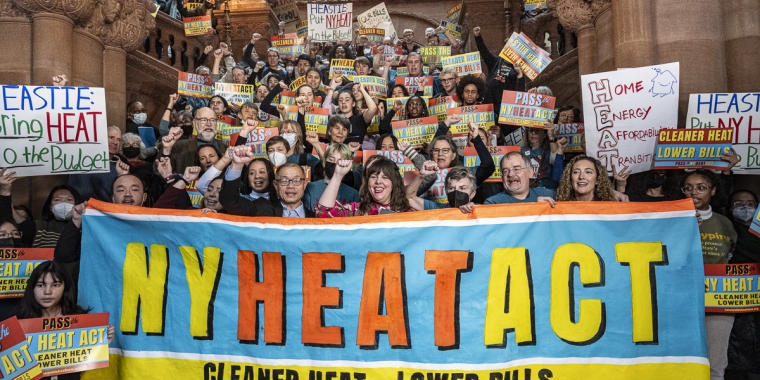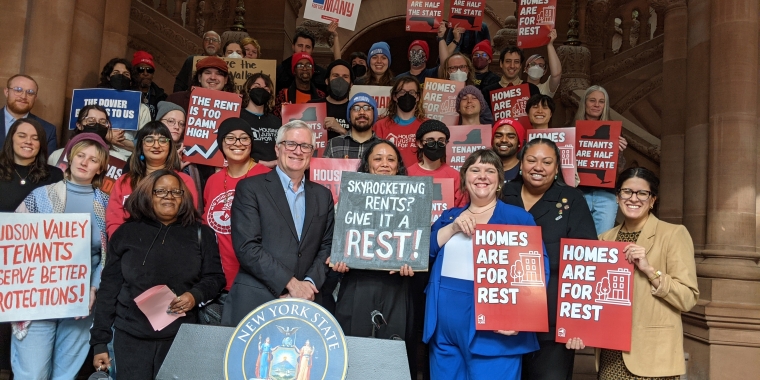
State Lawmakers Will Reconvene to OK Covid-19 Bills, Extend Child Victims Act

On May 26, 2020, Tom Precious of the Buffalo News filed a story regarding legislation to be taken up as the legislature reconvenes, including the Emergency Rent Relief Act and a bill to provide mortgage forbearance for homeowners. The full text is below; the original version is available via the link above.
________________
State lawmakers Will Reconvene to OK Covid-19 Bills, Extend Child Victims Act
By Tom Precious
Published May 26, 2020|Updated May 26, 2020
ALBANY – They’re returning.*
State lawmakers, out of session nearly two months since the Covid-19 pandemic spread across the state, will reconvene the two houses on Wednesday to take up more than two dozen coronavirus-inspired measures.
About that asterisk: Many lawmakers will be voting remotely, from their offices or homes, as social distancing rules are enforced among legislators who have seen the virus within their own ranks over the past couple months. Remote voting in the Senate and Assembly is now allowed under changes in the internal rules of the two houses put into place because of the pandemic.
A slew of coronavirus-inspired consumer protections, including for renters and homeowners, are set to be approved by the time lawmakers end this week’s session on Wednesday or Thursday. Localities would be given broad new powers to automatically extend certain borrowing authorizations, to spend certain capital funds without voter approval and tap into capital funds for operating expenses.
While the focus is on virus-related bills, lawmakers are also exerting their authority on several other fronts after watching Gov. Andrew M. Cuomo be the only face of state government since the first week of April.
Chief among them is a measure to further extend the window for victims of child sexual abuse to file civil suits beyond statute of limitations restrictions. The Child Victims Act, which has been heavily used by adults in Western New York who say they were abused as children, would permit civil cases under the special statute of limitations provision to be brought for an additional year until Aug. 14, 2021. That deadline was recently extended six months until January by Cuomo, who cited coronavirus-fueled delays for victims because of closures in the court system.
State Sen. Brad Hoylman, a Manhattan Democrat and sponsor of the Child Victims Act in the Senate, called the additional year to bring cases necessary because many victims needed more time – emotionally and legally – to commence a case than the original one-year window.
Hoylman said Tuesday that the rationale for the case filing extension – a route already taken in other states – "was certainly compounded by the pandemic." He said child abuse survivors "have, like most New Yorkers, had their lives turned upside down by Covid-19 and can't be expected to make time-consuming and important decisions about whether to go forward with a claim against an abuser or an institution that may have protected that abuser."
The New York State Catholic Conference, the public policy arm of Catholic churches across the state, did not say if supports or opposes the proposed new deadline.
"The Child Victims Act has provided recourse to survivors of abuse, wherever and whenever it occurred. Regardless of the status of the CVA, the Catholic Church will continue to focus on supporting and ministering to survivors, no matter how long ago it occurred," the group said Tuesday.
Relief for Renters, Homeowners
The Legislature’s main work this week – which commenced in committee meetings on Tuesday at the Capitol, state legislative office building and remotely from lawmakers’ homes across the state – is related to Covid-19.
With the state’s economy hit hard and tax revenues for Albany sliding, the lawmakers are focusing on no-cost Covid-19 measures, or, at least, those that won’t cost the state substantial funds.
The biggest item, cost-wise, is the Emergency Rent Relief Act of 2020. It calls for the state providing vouchers to landlords whose tenants are unable to pay rent due to a specific impact of the Covid-19 pandemic.
The bill’s cost would be capped at $100 million, and lawmakers envision Washington – not the state – picking up the tab.
The legislation covers the period of April 1 through July 31. Tenants, according to the sponsors’ memorandum outlining its justification, have to have a rent burden that is more than 30% of their household income. Vouchers would be targeted to cover tenants making up to 80% of an area’s median income level prior to March 7. The bill gives the state’s housing agency authority to direct vouchers for households “with the greatest economic and social need” and for such factors as the risk of homeless presented by being unable to pay rent.
For homeowners with a mortgage, lawmakers are poised to approve a measure requiring banks and mortgage companies regulated by New York to grant 90 days of forbearance to homeowners able to demonstrate a financial hardship because of the pandemic. The forbearance period could last for six months and be extended further if conditions warrant. It would not apply to certain home mortgages, such as those made through federal banking institutions. The forbearance period could be backdated to March 7.
The sponsors say the legislation is much stricter, and for a longer period, than a mortgage forbearance program Cuomo started using his executive order powers. They said it would bring state mortgage programs in line with federal mortgage policies during the pandemic. Late fees or negative reports to credit agencies would also be banned by the legislation.
“While the governor’s executive order provides immediate relief to some homeowners, it still allows for mortgage lenders to collect the back payments as soon as the forbearance period is over. Many homeowners will not be able to pay the lump sum of their arrears once forbearance ends if they have been unable to work," said the bills Democratic sponsors, State Sen. Brian Kavanagh of Manhattan and Assemblywoman Nily Rozic of Queens, in a memorandum they filed with their legislation.
The legislation calls for mortgage lenders to extend the loan’s period for consumers who obtain a forbearance or to push off a balloon payment to cover the amount withheld because of the pandemic until the maturity of the loan.
Lawmakers advanced dozens of bills in committees on Tuesday.
"The pandemic just created a ripple effect that touched every part of our society, touched every part of New York State government, so we're taking up issues ranging from workers' compensation to small business loans to library construction," said Assemblyman Sean Ryan, a Buffalo Democrat.
Ryan has a bill set for a vote Wednesday to give libraries 12 additional months to finish construction projects funded mostly by state grants that have been on hold during the pandemic.
Other measures set to be passed Wednesday or Thursday include:
- Ensuring that schools that shut down because of Covid-19 do not face any loss of state aid for failing to meet minimum requirements for classroom days in a school year.
- Permanently banning utilities from shutting off consumers’ service during pandemics or when a state emergency is declared.
- Allowing localities to let property tax owners defer payments – up to 120 days – on their city, town, village, county or school property tax bills.
Another bill would expand the lending authority of local economic development agencies to assist small businesses and nonprofit agencies to help them purchase supplies and equipment to help reduce the Covid spread.


